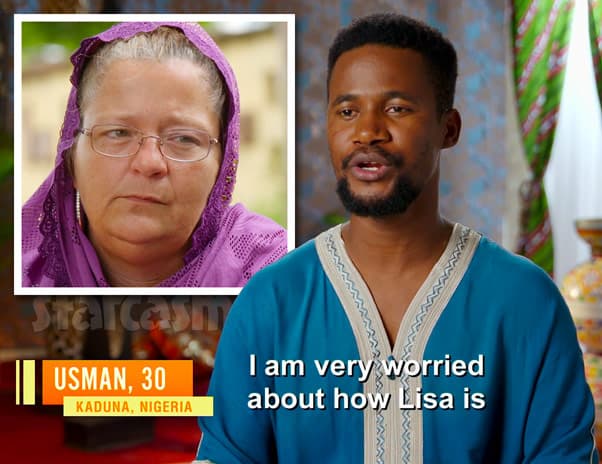BEFORE THE 90 DAYS Niles sued Alabama city for discrimination in 2020
90 Day Fiancé: Before the 90 Days star Niles Valentine reveals on the show that he suffers from autism spectrum disorder. Niles was also very open about his condition with a former employer, but that employer allegedly didn’t take Niles’ condition very seriously. The result was a hostile work environment in which Niles says he suffered coercion, threats, and intimidation.
Niles was eventually fired, and he filed a lawsuit against his employer, a city in Alabama, under the Americans with Disabilities Act and the Rehabilitation Act.
Niles Valentine Lawsuit Details
Niles Valentine was hired for a job in the Drainage Department of the Public Works Department for the City of Saraland, Alabama in August of 2019. Niles disclosed to his employers that he had a disability, autism spectrum disorder, and “he needed accommodations consisting of a safe environment, people to give him time, and not to be harassed at work.”
Despite being assured that his “disability would not be an issue,” it only took a couple of weeks on the job for Niles to realize that was not the case. He “started to be harassed, intimidated, threatened, and coerced by his coworkers due to his communication issues associated with his disability,” according to court documents.
Niles took the problem to his superiors multiple times, but his complaints were allegedly downplayed. Eventually, another employee complained about Niles, and Niles was fired.
In June of 2020, Niles Valentine sued the City of Saraland, Howard Rubenstein (the Mayor of Saraland), and Warren Stephens (Public Works Superintendent of the City of Saraland).
Niles and the defendants were ordered to participate in an Alternative Dispute Resolution (ADR) program. A joint ADR statement was filed on August 20, 2021 that stated, in part:
The parties have engaged in settlement discussions, but have been unable to reach a settlement. Based on the current status of this case, the parties do not feel that any form of alternative dispute resolution would assist the parties at this time.
A joint stipulation of dismissal was filed on August 26, 2021.
Niles Valentine Lawsuit Excerpts
Niles Valentine was diagnosed with Autism Spectrum Disorder in the 8th grade.
Autism Spectrum Disorder is a developmental disorder affecting communication and behavior characterized by difficulty with communication and interacting with other people, restricted interests and repetitive behaviors, symptoms that affect the person’s ability to function in school, work, and other areas of life.
While taking college classes at Coastal Alabama Community College, formerly Faulkner State Community College, Mr. Valentine sought assistance from the Alabama Depai1ment of Rehabilitation Services.
Local district representative, Jacque Creagh, provided Plaintiff with assistance; one aspect was job placement assistance.
Ms. Creagh knew Warren Stephens, Superintendent at the Public Works Department of Saraland. She phoned him and provided Stephens with Plaintiffs contact information in August of 2019. Stephens contacted Mr. Valentine arranging an in-person interview.
During the interview, Mr. Valentine disclosed he had a disability, autism spectrum disorder, and he needed accommodations consisting of a safe environment, people to give him time, and not to be harassed at work. Stephens assured Mr. Valentine that a good set of people worked there, and they were hard workers. He told Mr. Valentine that his disability would not be an issue.
Mr. Valentine began his employment in the Drainage Department of the Public Works Department for the City of Saraland in August of 2019. After two weeks of employment, Mr. Valentine started to be harassed, intimidated, threatened, and coerced by his coworkers due to his communication issues associated with his disability.
In November of 2019, a co-worker threatened Mr. Valentine once again. Mr. Valentine had reached the threshold of being unwilling to take this abuse any longer. He reported it to his immediate supervisor, Michael Hall, a Public Service Worker II. Mr. Hall notified Stephens. Mr. Valentine and Stephens met one-on-one in Stephens’ office to discuss the event and situation. The next day, Stephens called a meeting in the break room with the entire ditch crew. He advised the employees to get along, do their jobs, and that no one was being moved to another department. He also said that anyone complaining would “get a free pass out” of there. Mr. Valentine took that statement to mean if you complained, you would get fired.
In December of 2019, Mr. Valentine was threatened, coerced, and intimidated again by coworkers. He reported this to his immediate supervisor, Michael Hall. Stephens called a meeting within the hour for the break room. Stephens inquired about the incident. During the meeting, Mr. Marquis Cheney stated, “How about I beat the sh*t out of you?” to the Plaintiff in front of Stephens. Stephens counseled the employees to not discuss anything amongst themselves and to “just say hi and bye.” During the meeting, Stephens spoke to Mr. Valentine informing him that “people like you would get a beating on the street.” Stephens ended the meeting with the similar warning that “anyone breaking the rule would be given a free pass out” of there.
On January 22, 2020, Michael Hall called Mr. Valentine and two other co- workers in their work truck to go back to the break room for a meeting with Stephens. A co worker had made a complaint against Mr. Valentine. Stephens noted to Mr. Valentine that this was the third incident Mr. Valentine had faced. Stephens said he would be meeting with Mayor Howard Rubenstein to discuss the Plaintiff’s employment. Following this meeting, Mr. Valentine was sent back to work.
The next day, on January 23, 2020, Stephens called Mr. Valentine into his office before the shift started. Stephens informed Mr. Valentine that he could be fired for any reason. The Plaintiff was then fired based on the complaints that he had made, and because Stephens felt he had to call three meetings because of Mr. Valentine’s complaints. Mr. Valentine had rocked the boat based on his complaints, and Stephens followed through on his threats to give him a “free pass out” of there if he kept complaining.
While Mr. Valentine was terminated, the co-worker who had brought the complaint on January 22, 2020 was not terminated.
…The Defendants intentionally, willfully, and maliciously discriminated and retaliated against Mr. Valentine by failing to provide his accommodations and by terminating him because of his disability. The Defendants were aware of Mr. Valentine’s disability. They did not provide a safe environment for him free of coercion, threats, and intimidation. Alternatively, and/or additionally, Mr. Valentine was terminated because he sought those accommodations and advocated for himself to obtain them. When he complained of his treatment, he was threatened with termination, and eventually terminated.
As a proximate cause of the wrongful acts of Defendants, the Plaintiff avers he has suffered, and will continue to suffer, economic losses, lost wages, income, mental anguish, and other compensatory damages. The Plaintiff has suffered, and will continue to suffer, humiliation and mental distress as a result of the Defendants’ behavior towards him. He has suffered, and will continue to suffer, lost professional reputation, consequential damages and other economic losses due to said actions of Defendants. The Defendants’ actions have caused, and will continue to cause, substantial pecuniary, economic, and monetary losses, loss of enjoyment of life, and other non-pecuniary losses.
The Defendants’ actions were committed negligently, intentionally, knowingly, maliciously, in bad faith, and/or with reckless disregard for Plaintifrs state and federally protected rights.
Defendants Respond To Niles Valentin Lawsuit
The defendants in the lawsuit filed a response with 29 affirmative defenses. Below are a few examples.
Defendant asserts that it would have reached the same employment decision in the absence of any alleged bias or improper motive.
While denying that discrimination, retaliation or any other impermissible factor played any role with respect to any employment decision or act complained of by the Plaintiff, Defendant City would have taken the same actions regardless of any alleged improper or impermissible motive.
The Complaint fails to state a claim against Defendant upon which relief can be granted under the Americans With Disabilities Act, as amended, in that Defendant’s treatment of Plaintiff was at all times based on factors other than Plaintiff’s alleged disability.
Plaintiff’s claims are barred in whole or in part because Plaintiff is not a qualified individual with a disability as defined by the ADA, as amended.
All claims brought pursuant to the ADA with respect to acts or events occurring, or with respect to which Plaintiff was notified, prior to 180 days before the filing of Plaintiff’s Charge with the EEOC are barred by the applicable statute of limitations.
What Is Niles Valentine’s Current Job?
Niles Valentina has moved on from the lawsuit and his negative experience with the Saraland Drainage Department. He is currently the Director of Self-Advocacy for the Division of Developmental Disabilities at the Alabama Department of Mental Health!
Here is the scoop on Niles’ job from The Advocator:
Niles Valentine, a passionate advocate and self-advocate for disability rights, has been appointed as the new Director of Self- Advocacy for the Division of Developmental Disabilities at the Alabama Department of Mental Health. Niles, 28, was diagnosed with autism at 13 and has since been committed to navigating and improving a world not built for people like him.
Niles’s journey has been shaped by two key concepts: interdependence and customized employment. He believes in fostering communities where everyone’s contributions are valued and tailoring job responsibilities to individual strengths. Niles sees autism not as a limitation, but as a different way of approaching things, often leading to innovation and progress.
In his new role, Niles is excited to launch an Advisory Council comprising self-advocates and representatives from disability organizations. The council will focus on those served by the Alabama Department of Mental Health’s Division of Developmental Disabilities, working to identify and address community needs.
The council’s priorities include promoting self-advocacy skills, increasing access to customized employment, fostering interdependence, and advocating for policies that support full inclusion in society. Niles is confident that the Advisory Council can make a significant difference in the lives of people with disabilities in Alabama, and he is committed to creating a more inclusive and equitable future for all.
In addition to his work with the Advisory Council, Niles is also a strong advocate for increasing the involvement of people with disabilities in the political process. He believes that it is essential for people with disabilities to have a seat at the table when decisions are being made that affect their lives.
Niles is also a firm believer in the power of education. He is currently pursuing a degree in social work, and he plans to use his education to help others with disabilities achieve their full potential.
Niles is a passionate and dedicated advocate for disability rights. He is committed to making a difference in the lives of people with disabilities in Alabama and beyond.
Asa Hawks is a writer and editor for Starcasm. You can contact Asa via Twitter, Facebook, or email at starcasmtips(at)yahoo.com







